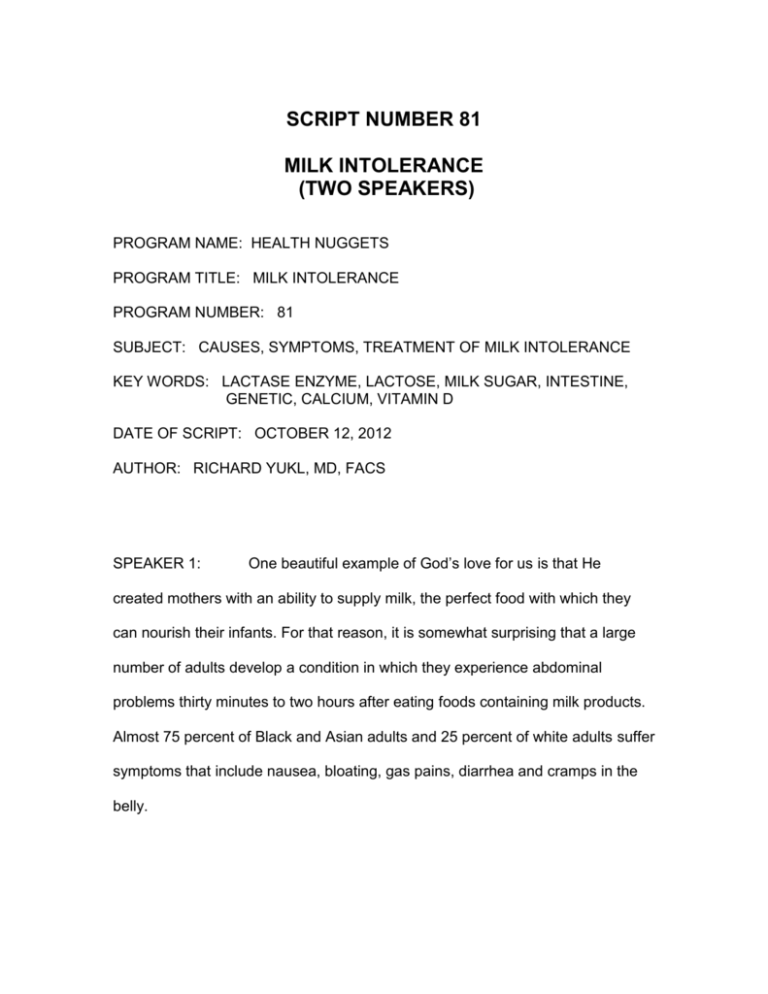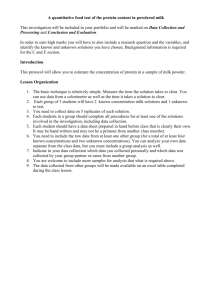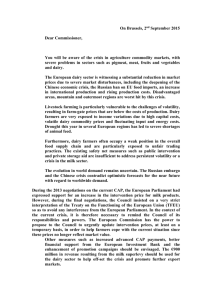script number 81 milk intolerance (two speakers)
advertisement

SCRIPT NUMBER 81 MILK INTOLERANCE (TWO SPEAKERS) PROGRAM NAME: HEALTH NUGGETS PROGRAM TITLE: MILK INTOLERANCE PROGRAM NUMBER: 81 SUBJECT: CAUSES, SYMPTOMS, TREATMENT OF MILK INTOLERANCE KEY WORDS: LACTASE ENZYME, LACTOSE, MILK SUGAR, INTESTINE, GENETIC, CALCIUM, VITAMIN D DATE OF SCRIPT: OCTOBER 12, 2012 AUTHOR: RICHARD YUKL, MD, FACS SPEAKER 1: One beautiful example of God’s love for us is that He created mothers with an ability to supply milk, the perfect food with which they can nourish their infants. For that reason, it is somewhat surprising that a large number of adults develop a condition in which they experience abdominal problems thirty minutes to two hours after eating foods containing milk products. Almost 75 percent of Black and Asian adults and 25 percent of white adults suffer symptoms that include nausea, bloating, gas pains, diarrhea and cramps in the belly. SPEAKER 2: Enzymes help our bodies absorb the foods we eat, and the reason for intolerance to milk is that the intestine of some adults does not generate enough of an enzyme called lactase, created to help us digest lactose, a sugar commonly found in milk and other dairy products. Normally, the cells that line our small intestine produce this enzyme, and it breaks the milk sugar into two separate pieces that can then be absorbed into our bloodstream. Without the enzyme, most of the milk sugar moves unprocessed into our colon, where bacteria attack it, causing the uncomfortable symptoms. SPEAKER 1: Are there different types of milk intolerance? SPEAKER 2: There are three specific types. In the usual type, our body produces the lactase enzyme normally when we are born, but it produces less and less of it as we age. In a second type, enzyme production decreases following intestinal surgery or injury to our bowel by such insults as radiation therapy for abdominal cancer or trauma. The body can frequently restore production of the enzyme with time. The final type of milk intolerance is very rare, but in this type, babies are born with no ability to generate any lactase enzyme. This type of intolerance is genetic and is passed from generation to generation, with both the mother and father having the same problem as their child. SPEAKER 1: Is milk intolerance an allergy? SPEAKER 2: No. The most common type is a condition in which our body produces adequate enzyme to allow us to be nourished by milk at the time in our lives when we need milk. Later, when other foods should be eaten for nourishment, our body produces less and less enzyme, making milk and dairy products harder and harder to process. SPEAKER 1: How is milk intolerance diagnosed? SPEAKER 2: A doctor may suspect milk intolerance based on our symptoms, and on our response if we reduce the amount of milk and dairy products in our diet. The diagnosis can be confirmed by a test in which we are asked to drink a solution containing a large amount of the milk sugar lactose. Two hours later, if our blood sugar level has not risen, our body isn’t properly digesting milk sugars and the diagnosis is made. SPEAKER 1: How can I prevent milk intolerance? SPEAKER 2: Milk intolerance cannot be prevented, and there is no known cure, as science currently is not able to boost a body's production of the lactase enzyme. Most people with symptoms can, however, be effectively treated by reducing the amount of milk products they consume. SPEAKER 1: symptoms. Describe the ways we can use to decrease the SPEAKER 2: Consuming smaller portions of milk and dairy products can decrease symptoms. The smaller the portion, the less likely it is to cause problems. Also, drinking milk along with other foods will slow the digestive process, and that may lessen symptoms. Experiment with different dairy products, because they do not all contain the same amount of milk sugar. Hard cheeses such as Swiss or cheddar have smaller amounts, and they generally cause fewer symptoms. Or, you may be able to tolerate cultured dairy products such as yogurt. The bacteria used in the culturing process naturally produce the lactase enzyme that breaks down lactose. Milk and dairy products can be hidden in processed foods such as cereals, soups, salad dressings and baking mixes. You can avoid the milk and dairy products hidden in these foods by reading the nutrition labels of prepared foods, looking for milk and lactose in the list of ingredients. Most grocery stores even sell foods that are labeled “lactose-free”. SPEAKER 1: Won’t avoiding milk and dairy products mean my health will suffer from a resulting lack of such essential nutrients as calcium and vitamin D? SPEAKER 2: Calcium can found in other foods - foods such as broccoli, spinach, oranges, pinto beans, and in milk substitutes such as soymilk and rice milk. Vitamin D, like calcium, is important in keeping your bones strong, and it can be found in non-dairy foods such as eggs and mushrooms. Additionally, your body makes vitamin D when you are exposed to the sun. Because the number of foods that contain vitamin D is limited, ask your doctor or a dietitian to help you plan your meals, and ask your doctor if you need to take calcium or vitamin D supplements. SPEAKER 1: Milk intolerance will really limit my life, won’t it? SPEAKER 2: Milk is not a poison to you. It may not even be necessary for you to avoid all dairy products completely. Most people with milk intolerance can enjoy some amount of milk and dairy foods without suffering symptoms. Experiment with your diet. You may be able to tolerate low-fat milk or skim milk, or dairy products such as yogurt, even if you don’t tolerate whole milk. If you continue to experience symptoms despite making dietary changes, the lactase enzyme can be purchased without a doctor’s prescription. Taking the enzyme tablets or a few drops of the liquid enzyme when you eat milk or dairy products may make these foods more tolerable. SPEAKER 1: Health Nuggets is written by Dr. Richard Yukl, a medical doctor working in the United States. The medical views expressed in this program are his and may differ for your particular health needs. If you need medical advice, please consult a medical professional in your area.






